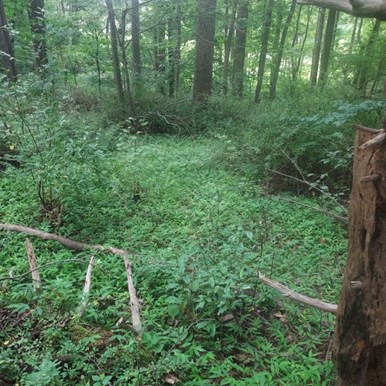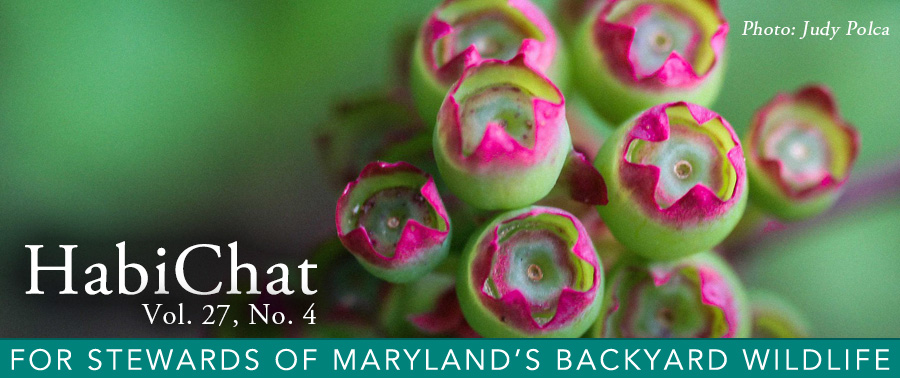Invasive Plants in Your ‘Backyard’
Guest Author: Joel Cockerham, Natural Resources Technician
Hello Habichatters! File this under “notes from the field,” in which we give you a peek into the daily challenges and triumphs of managing a rare ecosystem. And we’ll share how you can help us manage the invasive species in our backyard with the choices you make for your backyard.

A landscape of invasive plants at Soldier’s Delight with Wavyleaf basketgrass carpeting the forest floor, two autumn olive bushes in the foreground. Maryland DNR photo
Soldiers Delight Natural Environment Area in Owings Mills is home to a rare ecosystem, the serpentine barrens. Also called an oak savanna, this tall grassland (and the surrounding forests) supports more than 30 rare plant and animal species! Several thousand years ago, this ecosystem formed in the presence of fire, started either by lightning strikes or by the indigenous people. Species that survive this type of disturbance are called fire-tolerant. One of the most interesting and challenging tasks we perform at Soldier’s Delight is to mimic these historic fires by conducting prescribed burns, also known as controlled burns. Fire serves two purposes: it removes any buildup of organic material that would change the unique soil composition; and it knocks back any invading non-native, fire-intolerant plant species.
Perhaps one of the biggest efforts we undertake to conserve this rare habitat is invasive species management. We use a variety of methods, such as hand pulling and cutting, girdling trees, and careful use of herbicide, in addition to prescribed burns. Some of the worst invaders in the area include greenbrier (native to Maryland, but not to this fire-dependent ecosystem), autumn olive, Japanese barberry, Asian stilt grass, Japanese honeysuckle, Asiatic bittersweet, wineberry, Chinese silvergrass, and most recently wavyleaf basketgrass. This last species, wavyleaf, has been an important focus recently as it has the potential to become a big issue.
The summertime issue
Wavyleaf basketgrass is a recently introduced invasive species that first landed in Baltimore County near Patapsco Valley State Park. At Soldier’s Delight we are working to keep wavyleaf out of our managed areas and reduce the spread to surrounding areas. Wavyleaf, like most invasive plants, is capable of spreading and outcompeting native species very easily. Wavyleaf creeps along the ground, growing rapidly over leaf litter, logs, and rocks, spreading out over the forest floor, and creating a thick carpet that prevents other plants from growing. Wavyleaf also produces many seeds that have sticky hairs which cling to fur, feathers, and clothing to be spread elsewhere. At Soldier’s Delight we are managing wavyleaf two ways — by hand-pulling the plants in sparsely infested areas and disposing of them properly, and through the strategic use of herbicides in areas where the wayleaf has taken over other vegetation.
How you can help!
The first step in battling invasive plants is not to plant them. You can help fight invasive plants by learning about those in your state, county, and neighborhood; then take action in your own backyard! You can remove invasive plants from your yard, spread the word in your neighborhood, and report invasive plants you find elsewhere. Managing invasive plants in your own backyard helps us manage invasive plants across the state.
When talking about and trying to fight against invasive plants it can often seem like an impossible task, and if any one of us were tasked with managing them all it would be! But it’s times like this where we need to remember that we aren’t alone and take inspiration from the humble ant. Individually, ants aren’t capable of doing much and don’t even live for very long, but when they work together for a common goal, they can build incredible nests and take down massive foes. When it comes to fights that are much larger than any one of us, we must remember that our greatest ally is our neighbor. Sharing knowledge about invasive plants and encouraging others to join the battle and do the same with their neighbor has an exponentially greater effect than fighting on your own. Let’s spread the news and work together to fight against the invasive plants!


 1-888-373-7888
1-888-373-7888 233733
233733